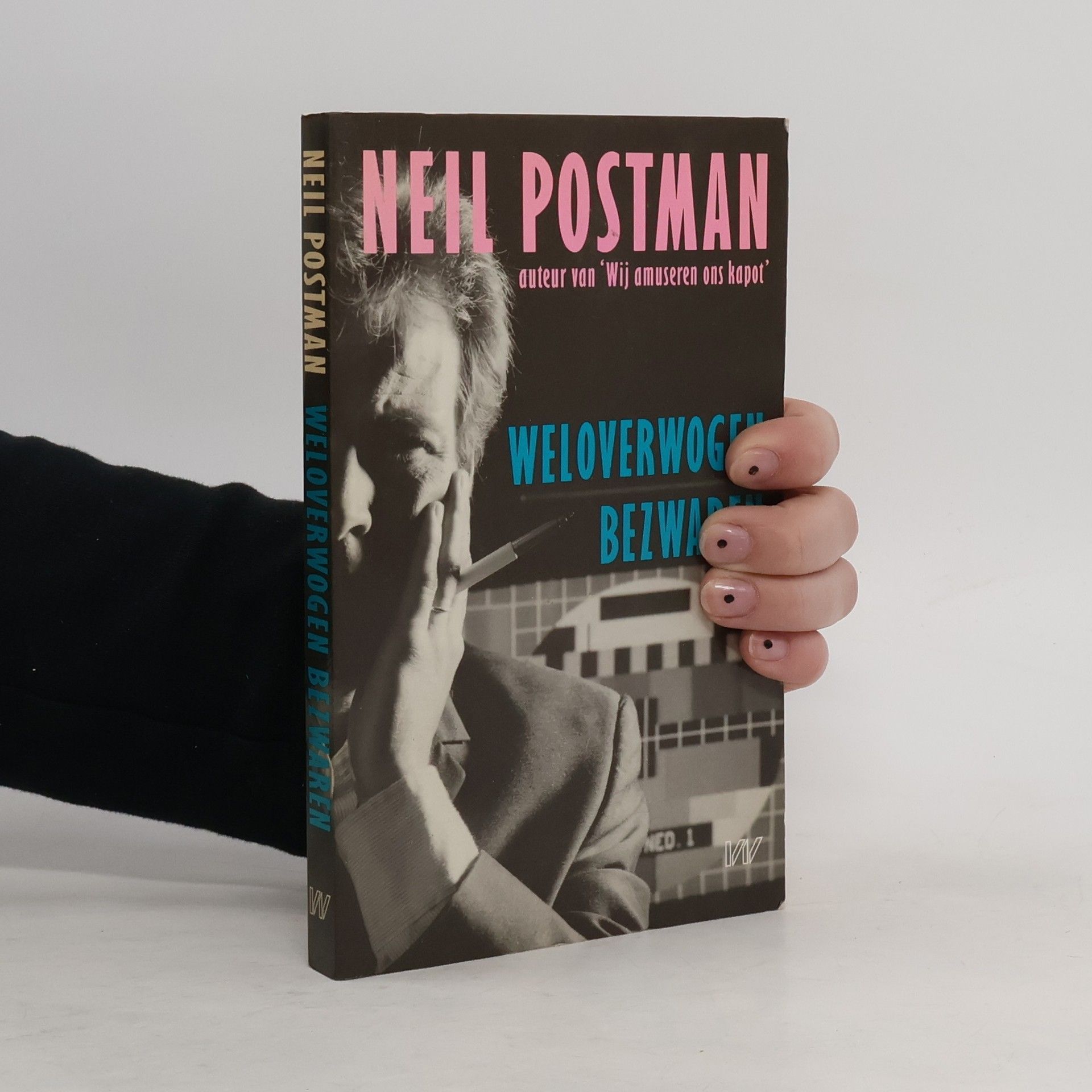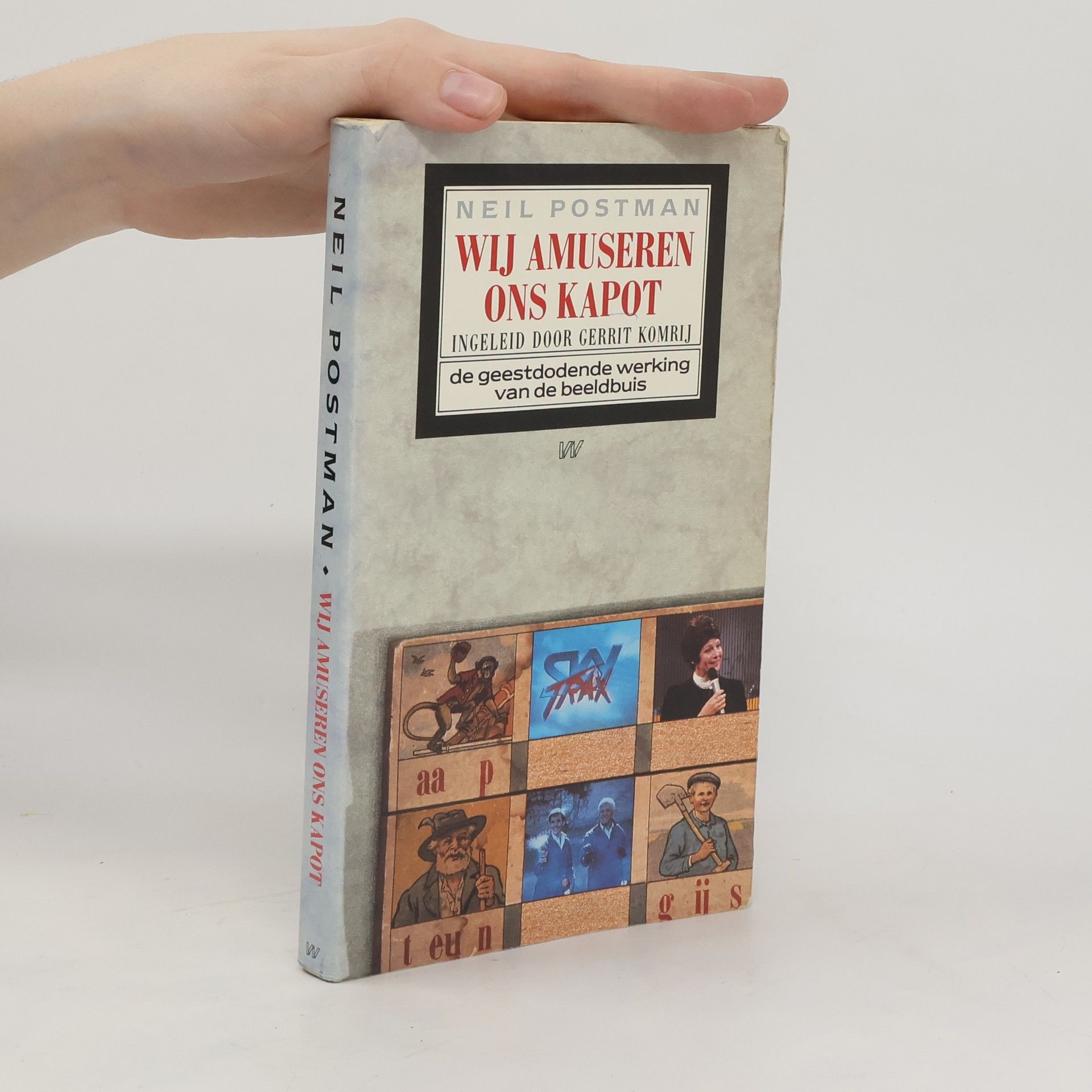Verhandeling over de invloed van televisie en de gevolgen daarvan voor de maatschappij.
Neil Postman Boeken
Neil Postman was een invloedrijke Amerikaanse pedagoog, mediatheoreticus en cultuurcriticus, vooral bekend om zijn kritische analyse van de impact van massamedia. Hij onderzocht hoe televisie en andere communicatievormen serieus denken vereenvoudigen en het discours ondermijnen door complexe kwesties te veranderen in oppervlakkig entertainment. Postman benadrukte dat interactieve betrokkenheid, in plaats van informatieoverdracht van bovenaf, cruciaal is voor echt leren. Zijn analyses bieden een blijvend perspectief op de relatie tussen informatie en menselijke reactie.







Waarvoor dienen scholen en opvoeding eigenlijk nog? Kan onderwijs alleen maar plaatsvinden in lokalen met stoelen en tafels? Waarom niet alle leerboeken in de vuilnisbak gedeponeerd? Neil Postman, die al sinds jaar en dag nauwgezet de Amerikaanse samenleving observeert, bekritiseert en wakker houdt, zet in dit boek vraagtekens bij het automatisme waarmee wij ons klakkeloos overgeven aan de technische manier van denken van de moderne tijd. Hij is van mening dat het 'einde van het onderwijs' nabij is als we ons niet welbewust nieuwe doelen stellen voor de opvoeding van onze kinderen. Evenals in zijn vorige boeken draagt Postman hier opnieuw provocerende ideeën aan voor een andere manier van denken over onze samenleving. Wij voeden op tot niets is een onmisbare gids voor ieder die zijn kinderen of leerlingen liefheeft.
Weloverwogen bezwaren
Tegendraadse beschouwingen over taal, technologie en onderwijs
- 173bladzijden
- 7 uur lezen
Amusing ourselves to death. Public discourse in the age of show business
- 208bladzijden
- 8 uur lezen
Television has conditioned us to tolerate visually entertaining material measured out in spoonfuls of time, to the detriment of rational public discourse and reasoned public affairs. In this eloquent, persuasive book, Neil Postman alerts us to the real and present dangers of this state of affairs, and offers compelling suggestions as to how to withstand the media onslaught. Before we hand over politics, education, religion, and journalism to the show business demands of the television age, we must recognize the ways in which the media shape our lives and the ways we can, in turn, shape them to serve out highest goals.
From the vogue for nubile models to the explosion in the juvenile crime rate, this modern classic of social history and media traces the precipitous decline of childhood in America today ˆ’and the corresponding threat to the notion of adulthood.Deftly marshaling a vast array of historical and demographic research, Neil Postman, author of Technopoly, suggests that childhood is a relatively recent invention, which came into being as the new medium of print imposed divisions between children and adults. But now these divisions are eroding under the barrage of television, which turns the adult secrets of sex and violence into popular entertainment and pitches both news and advertising at the intellectual level of ten-year-olds.
From a renowned social critic, an intriguing look at how high technology is changing our society and culture, and what this means for our future. Postman suggests ways in which a true democracy can use its technical skills not to control but to enhance human endeavor and preserve freedom and individuality.
Building a Bridge to the 18th Century
- 224bladzijden
- 8 uur lezen
In Building a Bridge to the 18th Century, acclaimed cultural critic Neil Postman offers a cure for the hysteria and hazy values of the postmodern world. Postman shows us how to reclaim that balance between mind and machine in a dazzling celebration of the accomplishments of the Enlightenment-from Jefferson's representative democracy to Locke's deductive reasoning to Rousseau's demand that the care and edification of children be considered an investment in our collective future. Here, too, is the bold assertion that Truth is invulnerable to fashion or the passing of time. Provocative and brilliantly argued, Building a Bridge to the 18th Century illuminates a navigable path through the Information Age-a byway whose signposts, it turns out, were there all along.
How to watch TV news
- 178bladzijden
- 7 uur lezen
A scathing and prescient look at television news' now updated for the new tech-savvy generation Television news : genuine information or entertainment fodder? Fifteen years ago, Neil Postman, a pioneer in media education and author of the bestselling Amusing Ourselves to Death, and Steve Powers, an award-winning broadcast journalist, concluded that anyone who relies exclusively on their television for accurate world news is making a big mistake. A cash cow laden with money from advertisers, so-called news shows glut viewers with celebrity coverage at the cost of things they really should know. Today, this message is still appallingly true but the problems have multiplied, along with the power of the Internet and the abundance of cable channels. A must-read for anyone concerned with the way media is manipulating our worldview, this newly revised edition addresses the evolving technology and devolving quality of America's television news programming.
Technopol" to przede wszystkim książka opowiadająca się za ludzką autonomią, wolnością i twórczością. Błyskotliwy pamflet nie tyle na technikę, ile na stechnicyzowanych ludzi owładniętych ideą, że środki techniczne mogą ich wyręczyć w myśleniu i działaniu.



